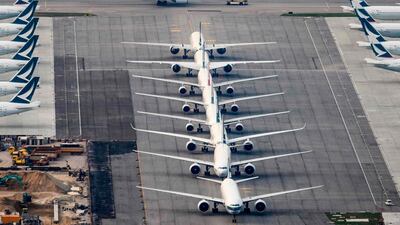The group of world’s seven biggest economies issued a set of recommendations as part of their Covid-19 pandemic response strategy to help restore confidence in global transportation, travel and tourism.
Objectives laid out by the G7 countries address all modes of transportation – air, land and sea, the US Department of State said in a statement on Wednesday. Coordination between governments, industries and international organisations is necessary for the revival of global travel, it added.
The G7 will share the “high-level transportation principles” with the G20 group of industrialised nations. Other key international partners including the International Civil Aviation Organisation and the International Maritime Organisation will also be invited to join the effort.
The G7 group of countries members are Canada, France, Germany, Italy, Japan, the UK and the United States, which currently holds its rotating presidency.
The state department said the G7 recognises the ongoing challenges in the wake of the Covid-19 pandemic, which has tipped the global economy into the steepest recession since the Great Depression. The International Monetary Fund expects the global economy to contract 4.9 per cent this year before making a sluggish recovery in 2021.
Most countries around the world have opened up gradually. According to a a report by the UN's World Tourism Organisation, 87 destinations have now eased travel restrictions following the pandemic.
However, demand for travel has seen a slower-than-expected pick up. The global travel and tourism is still reeling from the effects of movement restrictions and border closures that were put in place to curb the spread of the pandemic.
Earlier this week, the International Air Transport Association said global air passenger traffic is unlikely to recover to pre-Covid-19 levels before 2024, a year later than previously expected. Slower virus containment in the US and other developed countries, weaker corporate travel and lack of consumer confidence were cited among reasons behind the bleak outlook, Iata said in its revised five-year forecast.
The G7 countries, however, said governments and industry bodies should work together to ensure global transportation routes and supply chains remain open, safe and secure. They should recognise the importance of transportation in facilitating repatriation efforts and suggested designating transportation and critical infrastructure workers as “essential” employees.
The G7 also called for efforts to restore passenger and transport operators’ confidence in health systems and safety measures that are in place for safe travelling, the statement said.
Clear messages on the nature and purpose of health and safety measures need to be communicated to the public. Any measures to mitigate risk should be “appropriate” and should “avoid unnecessary burdens on the public or industry”.
The G7 underscored the importance of "compatible requirements" for the transportation sector in response to Covid-19 to "avoid a global patchwork of health safety measures and to minimise market access barriers and burdens on transportation operators”.
Countries should recognise transportation as a “driver of economic recovery, and aviation’s particular role, in revitalising global economic growth, travel, and tourism” it said.
The G7 countries said the governments and international organisations should also chart out an international approach in dealing with aircrews and their safety in the wake of the pandemic.
Such an approach, the G7 said, should not affect aviation operations and need to be consistent with recognised public health standards including testing, quarantine requirements, travel to and from their worksite and immigration restrictions that apply to other travellers.
The G7 also encouraged discussions among countries to sharpen their responses to Covid-19 outbreaks at sea and develop a system for the treatment of affected maritime crews.
Countries should promote a “safe and secure workplace for seafarers and their access to prompt and adequate medical care both on board and on shore”, it said.


